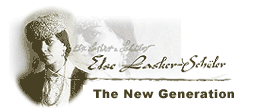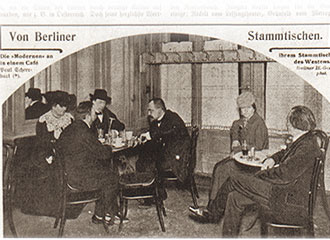
The break with bourgeois
convention was typical for many of the young Berlin Jewish intellectuals
who rose to prominence in the years following 1900, especially during
the "Expressionist decade," from 1910 to 1920. They fought against
everything the earlier generation had considered desirable —
upward mobility, social status, and prosperity.[1]
Young Jews were especially attracted to the "new direction,"
that is, to Expressionism, for a number of reasons. Their fathers were
members of the complacent bourgeoisie. Their families practiced a faith
that had become superficial through assimilation, or they continued to
adhere to a constricting religious orthodoxy. Both forms of religious
observance were entirely unsatisfactory for a new generation that confronted
daily the astonishing changes taking place in politics, the economy, and
art.

These
changes strengthened their belief in progress for all humankind, including
the Jewish people. Participation in modern culture promised an end to
cultural and social marginalization and to the isolation inherent in religious
orthodoxy. It meant not having to identify with the empire by assimilation
or with the conservative, Romantic "organic" Judaism of Eastern
Europe."[2] The best
possible means of escape form the position of outsider in German society
was found by many in the Expressionist movement, where "the German-Jewish
symbiosis seemed to have come closest to being realized."[3]
Indeed, the "cohabitation" and mutually beneficial collaboration
among Jewish and non-Jewish artists, writers, critics, collectors, and
promoters of modern art during this period could make one believe in this
debated symbiosis.
 |
[1]
Hans Tramer, "Der Expressionismus: Bemerkungen zum Anteil der
Juden an einer Kunstepoche," Bulletin des Leo Baeck Instituts
2, no. 5 (1958): 33-46.
[2]
Jon Milful, "Marginalität und Messianismus: Die situation
der deutsch-Jüdischen Intellektuellen als Paradigma für
die Kulturkrise 1910-1920," in Expressionismsus und Kulturkrise,
ed. Bernd Hüppauf (Heidelberg: Carl Winter, 1983), pp. 347-357.
[3]
Hanni Mittelmann, "Expressionismus und Judentum," in Conditio
Judaica: Judentum, Antisemitismus und deutschsprachige Literatur
vom Ersten Weltkrieg bis 1933/38 (Munich: C. H. Beck, 1997),
pp. 302-3.
|
 |
 From:
Bauschinger, Sigrid. "The Berlin Moderns: Else Lasker-Schüler
and Café Culture" in Berlin Metropolis: Jews and the
New Culture 1890-1918. Berkeley: University of California Press,
1999,. p. 63. From:
Bauschinger, Sigrid. "The Berlin Moderns: Else Lasker-Schüler
and Café Culture" in Berlin Metropolis: Jews and the
New Culture 1890-1918. Berkeley: University of California Press,
1999,. p. 63.
|
LASKER-SCHÜLER Introduction
|

